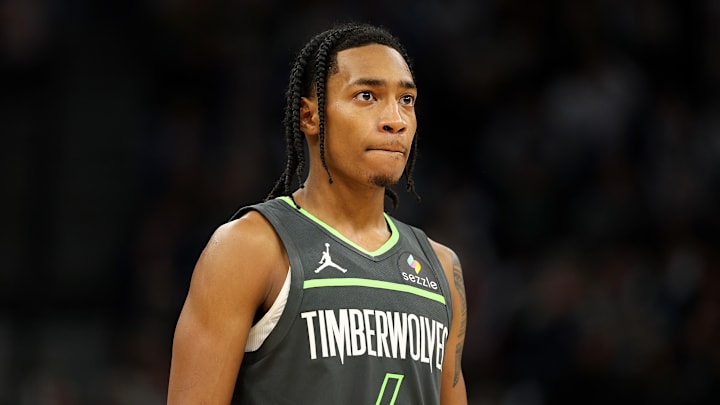Minnesota Timberwolves second-year guard Rob Dillingham is poised for a bigger role this upcoming season. While Dillingham's offensive skill set would give the Wolves a desired new element, there are concerns about his slight 6-foot-1 frame.
Listed at 176 pounds, the 20-year-old guard needs to add strength to reach his full potential. Undoubtedly, this would benefit Dillingham on both ends of the court, but especially on defense, which remains the biggest concern with his game.
How adding strength can improve Dillingham's offesnive game
None of this is to say that Dillingham can't be a productive offensive player with a slight frame. He is truly a gifted shot creator with dazzling handles and blazing speed. Notably, Dillingham shot 52.5 percent on drives and averaged 15.3 points per 36 minutes. Furthermore, Dillingham is a rock-solid playmaker. However, adding strength would certainly benefit Dillingham, especially as a finisher.
Adding some more muscle would allow Dillingham to finish through contact more comfortably. Improving on something that's already a strength of his would take Dillingham's offensive game to the next level.
Dillingham's defense would be the most signicant benefit from adding strength
Nevertheless, the real benefit of Dillingham bulking up would come on the defensive end of the court. Given his height, Dillingham will always be a target on defense. This will especially be problematic in playoff settings when matchup hunting becomes more prevalent. However, adding some muscle would help Dillingham hold up better when getting attacked defensively.
When looking at guards who are of a similar height to Dillingham, many of these players are significantly heavier. Fred VanVleet (6-foot, 197 pounds), Darius Garland (6-foot-1, 192 pounds), and Tyrese Maxey (6-foot-2, 200 pounds). Garland is the most reasonable physical comparison to Dillingham. As a rookie, like Dillingham, Garland weighed 175 pounds, and the two have somewhat similar offensive skill sets. Garland has never been a positive defender, but he has avoided being a complete liability with added strength.
VanVleet is one of the league's most impactful smaller guards on defense. While he has a more naturally sturdy frame, it shows the value of strength on defense. Dillingham's teammate, Mike Conley, who weighs 175 pounds and is in his prime, was one of the league's best perimeter defenders. However, Conley is an inch shorter than Dillingham and is the exception to the rule. Even if they are the same weight, Conley has a bit more muscle and is an incredibly intelligent basketball player. Overall, for the most part, guards who are smaller in height need to make up for it in muscle.
Again, none of this is to say that Dillingham must add 15 to 20 pounds right now to be a productive rotational player this season. However, for him to reach his ceiling, adding some strength will be necessary. Perhaps this will be a slower process for Dillingham, but it's something that must eventually happen.
Dillingham has star-level upside and could very well be the Wolves' point guard of the future alongside Anthony Edwards. Nevertheless, adding some strength will be crucial for Dillingham to fulfill this potential.
